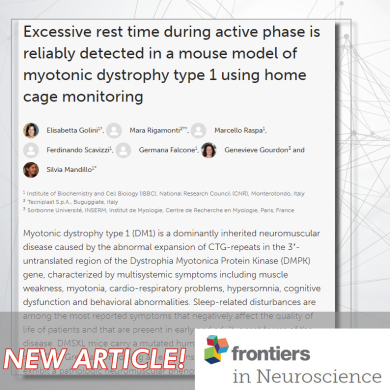

A recent study on myotonic dystrophy type 1 (DM1) and sleep difficulties has been published.
CTG-repeat expansion in the 3′-untranslated region of the Dystrophia Myotonica Protein Kinase (DMPK) gene causes dominantly inherited neuromuscular disease DM1. DM1 causes muscle weakness, myotonia, cardio-respiratory issues, hypersomnia, cognitive impairment, and behavioural abnormalities. Researchers examined sleep/rest habits in fragile DM1 mice using DMSXL animals, which possess a mutant human DMPK transgene with >1,000 CTG-repeats. An automated home cage-based system monitored sleep/rest behaviors 24/7 non-invasively. Male and female DMSXL mice and their wild-type (WT) littermates were examined in Digital Ventilated Cages (DVC®) for 5 weeks, monitoring activity and rest parameters day and night. DMSXL mice displayed lower activity and regularity disruption index (RDI), higher zero activity per hour, and longer rest intervals during the active phase than WT mice. DMSXL mice' unique rest-related phenotype, measured unobtrusively, may help explain and treat DM1 patients' excessive daytime drowsiness.
This study emphasizes the need to understand the mechanisms of sleep-related problems in DM1 patients and provides a mouse model to examine future therapeutic strategies. The findings may help develop effective DM1 therapies and improve quality of life.